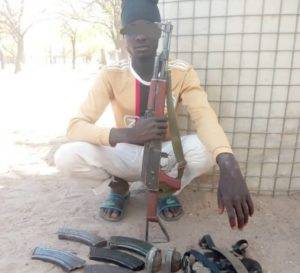In a significant stride towards restoring peace in the Lake Chad region, the Multinational Joint Task Force (MNJTF) has reported the surrender of two prominent commanders belonging to the Boko Haram faction of BAKOURA BUDUMA. Ibrahim Muhammed and Auwal Muhammed, alias WANKA, voluntarily surrendered to the troops of Sector 3 MNJTF in Nigeria on March 25, 2024. This development marks a crucial breakthrough in the relentless pursuit to neutralize terrorist elements operating in the area.
The surrender of these two commanders is credited to the heightened kinetic and non-kinetic operations executed by the MNJTF within Sector 3. The concerted efforts of the multinational force have intensified the pressure on terrorist groups, compelling individuals like Ibrahim and Auwal Muhammed to reconsider their allegiance and choose the path of surrender. This strategic shift underscores the effectiveness of the MNJTF’s comprehensive approach towards countering terrorism in the region.
Revealing Insights and Seized Items
Preliminary investigations into the backgrounds of Ibrahim and Auwal Muhammed have yielded valuable insights into their extensive involvement with the BAKOURA BUDUMA-led faction of Boko Haram. Both individuals confessed to serving under this faction for a staggering 15 years, operating primarily in KWALLARAM situated within the Lake Chad Islands. Their decision to surrender signifies a significant setback for the terrorist network, depriving it of experienced commanders and disrupting its operational capabilities in the region.
Furthermore, the recovery of assorted items from the surrendered terrorists underscores the gravity of the event. Among the seized items are weaponry and communication devices, including AK-47 rifles, magazines, ammunition, hand grenades, mobile phones, and handheld radios. These confiscated materials not only deprive the terrorist group of crucial assets but also provide valuable intelligence for ongoing counterterrorism efforts. With Ibrahim and Auwal Muhammed now in custody for further interrogation, authorities aim to extract additional information to dismantle terrorist networks and enhance security across the Lake Chad region.
Intensifying Kinetic and Non-Kinetic Approaches to Counter Boko Haram: A Path to Restoring Peace in Nigeria’s North East
Upholding a Comprehensive Strategy In the ongoing battle against Boko Haram insurgency in Nigeria’s North East, the imperative to intensify both kinetic and non-kinetic approaches has gained prominence. The strategic combination of military force (kinetic) and socio-economic interventions (non-kinetic) presents a multifaceted solution to address the root causes and manifestations of the conflict. This dual-pronged approach acknowledges the complex nature of the insurgency, which is not solely a military challenge but also rooted in socio-economic grievances and ideological indoctrination.
To effectively counter Boko Haram, it is essential to continue and enhance military operations aimed at neutralizing the group’s capabilities and dismantling its networks. The Nigerian Army, alongside regional and international partners, must maintain relentless pressure on Boko Haram strongholds while actively targeting its leadership and logistical infrastructure. Additionally, efforts to secure porous borders and disrupt the group’s financing channels are paramount in preventing its resurgence.
Sustaining Momentum for Total Elimination
While significant strides have been made in degrading Boko Haram’s operational capacity, the battle is far from over. The Nigerian Army must remain vigilant and proactive in rooting out the remnants of the insurgency to prevent any resurgence. This necessitates continuous intelligence gathering, enhanced surveillance, and coordination between security agencies to identify and neutralize Boko Haram cells operating within communities.
Moreover, the non-kinetic aspect of the strategy must be equally prioritized to address the underlying grievances and vulnerabilities exploited by Boko Haram for recruitment and support. Socio-economic initiatives, including job creation, education programs, and community development projects, play a crucial role in fostering resilience and reducing the appeal of extremist ideologies. By addressing the socio-economic root causes of the conflict, Nigeria can pave the way for sustainable peace and development in the North East region.
Ensuring Sustainable Peace and Development
The intensification of both kinetic and non-kinetic approaches is not merely a military imperative but a pathway to achieving lasting peace and prosperity in Nigeria’s North East. A comprehensive strategy that combines robust military operations with holistic socio-economic interventions is essential to address the complex dynamics of the conflict and prevent its recurrence. As the Nigerian Army continues to confront the remnants of Boko Haram, sustained momentum and coordination between security forces and civilian stakeholders are critical to consolidating gains and building a resilient society resilient to extremism. Only through a concerted effort to tackle the root causes of the insurgency can Nigeria pave the way for sustainable peace, political stability, and economic development in the region.
By prioritizing the intensification of both kinetic and non-kinetic approaches, Nigeria can overcome the scourge of Boko Haram and usher in a new era of peace and prosperity for the North East and the nation as a whole.
Table of Contents
Discover more from OGM News NG
Subscribe to get the latest posts sent to your email.














